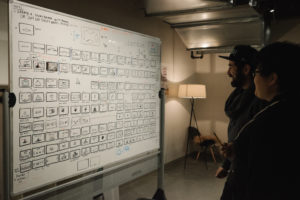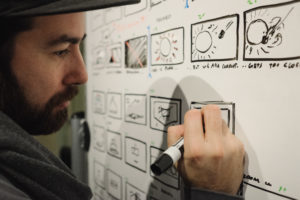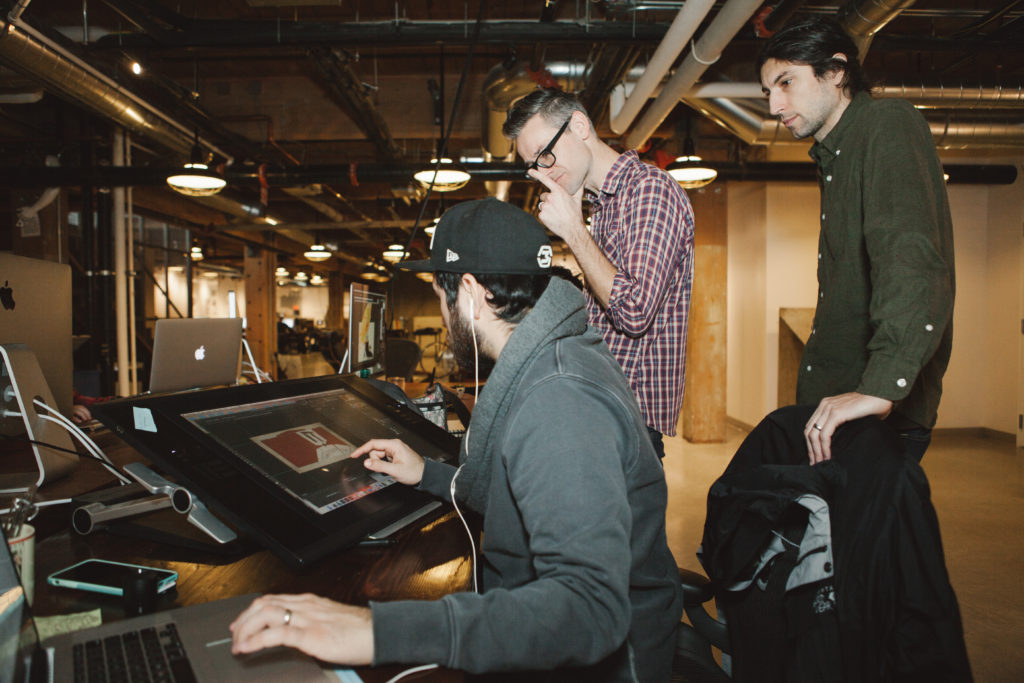
Local youth pastor interviews Jon Collins, co-creator of The Bible Project.
Have you ever read the Bible and walked away saying, “I have no idea what this means!”? First, I just want to tell you that you’re not alone on that journey. I’ve been and continue to be in that space a lot. However, one of the tools that I’ve used to navigate that space has been an organization called The Bible Project. The Bible Project is a non-profit animation studio that produces short-form, fully-animated videos to make the biblical story accessible to everyone, everywhere. They create videos, podcasts, and study guides that explore the Bible’s unified story.
I was curious to interview The Bible Project because I use a lot of their content in my youth group. Since they have given me a more holistic perspective on the Bible, I wanted to know more about their story and highlight the work they do both locally in Portland, Oregon, and globally. I got a chance to talk with Jon Collins, one of the co-creators of The Bible Project and discuss The Bible Project’s impact on Portland.
What does The Bible Project mean to you guys?
For both Tim and I, this is a meaningful project because we get to work out the questions we have. It allows us, as followers of Jesus, to give the Bible authority in our lives. Asking the question how do we allow this book to speak for itself? For us, it allows us to work through our faith and to create. I love to make things and Tim loves to study the Bible, and it’s a great way to execute these two things.
On a missional level, our hope is that we can help change the paradigm of how people view the Bible. One paradigm we see that isn’t helpful is that people view the Bible as just a divine instruction manual. Another paradigm is that it’s just a devotional handbag or inspiration kind of book. Other people see it as irrelevant or nonsense. We want to help people see the Bible as a unified story, a story that leads to and ends with Jesus. We want people to see the literary genius in the Bible. God used humans to write it in a very beautiful and artistic way.
How has The Bible Project impacted your personal lives?
Before this, I was making video for companies—specifically helping tech companies explain cloud computing software or new apps. I love explanation and I’ve always had this inclination to deeply understand and explain a healthy paradigm of the Bible through video. Growing up in the church, I was always taught to read the Bible and that the Bible was important. But I used the Bible to create systematic belief by pulling verses out and stringing them together. It was hard to both read the Bible and follow Jesus. For me, reading the Bible was actually difficult and made following Jesus harder. I was becoming this post-Bible Christian, but at the same time I loved theology, talking about God, and thinking about humanity through scripture. So, I wanted to think about these ideas and at the same time wanted it all to make sense, and be profound and beautiful. I heard pastors give really good sermons and expound on biblical principles. But, as an explainer, I wanted to take those theological concepts and create videos to help people understand the Bible well.
As I was contemplating this idea, I thought about how I always loved my conversations with my friend Tim Mackie around the Bible. I pitched this idea of doing a theology YouTube channel and his thought back was doing a Bible YouTube channel that looked at the structure, themes, and literary devices in the Bible. As we started working on these videos, the Bible became alive again. Now, as I open it up and let it speak for itself through its literary structures, it starts to come to life and recaptures my awe and imagination. I really see the divinity of the Bible, written by humans and designed by God to tell us what it means to be human, love people, and be in relationship with the Living God.
Do you feel like a lot of your questions were answered after co-creating The Bible Project? Or did you find more questions?
I found the questions I asked were good questions, but they were typical post-enlightenment American questions—and I was asking them of an ancient Jewish document. I’ve come to realize that the Bible is actually asking different questions than I was. In that way, it was giving me categories for how to think about the world in a way I’d never considered before. Some of the questions I had would get answered, and then some questions became irrelevant in the process of re-categorizing how I think about the world through the ancient Jewish lens of scripture.
Could you describe to us the “why” behind the many little humorous moments in the videos?
The humor is really just an extension of our personalities. We are trying to make videos that we would want to watch and we just love to incorporate humor. We want these videos to feel down to earth by presenting serious content while not taking ourselves too seriously. The humor allows us to do that. It allows you to relax while you are thinking about things that get at deep issues—concepts which are going to demand pretty radical things if you accept them. The tone we strive to communicate with is not preachy, but a tone that invites the viewer into the conversation of how fascinating the Bible is.
What is the creative process for the making of The Bible Project videos?
Our process begins in our recording room. Tim will have notes that he types up about our current subject. He’ll give me the notes and we will talk through them and begin to discuss the biblical framework going on in the text. I will ask questions. After this, I’ll go away and construct a first draft of my script, asking the question, “how would someone else comprehend the main parts of this?” Tim and I then work on the script together and bring it to our storyboard artist, Kayla, who walks us through exercises on visual beats, character, setting, and narratives.

![]()

She will go ahead and draw it all out. Sometimes we might re-write the script to clean it up a bit. We then take the storyboard and record the script. Afterwards, we do a slideshow of the storyboards over the audio, called an animatic. Finally, we ship it to our designer and animators who bring it to life.

What impact do you notice The Bible Project having specifically on the Portland area?
We definitely are a global project, but being in Portland, our main base of supporters is from this area. We’ve been able to connect with the local church community here in Portland. There are no big mega churches in Portland, just a bunch of small and medium-sized ones, and they all work together really well to serve Portland in a unifying way. We get the opportunity to be a part of the church in this way. Actually, soon we’ll be moving into a church. The beauty about this is that people would never expect to find theologically rich content in Portland, a city labeled as secular. The Bible Project is inspired by the spirit of pioneering prevalent in the Northwest that challenges people to explore new terrain.
One of the beautiful things I love the most about The Bible Project is that it embodies both the spirit of the Pacific Northwest and the heart of Christ. We’re an organization that seeks to meet people in their context and walk with them through the Bible, explaining the original ancient Jewish context and applying it to our lives today. The Bible Project gives space for people to engage with scripture and allow it to come to life.
Be sure to check out their page at thebibleproject.com and look them up on YouTube!

